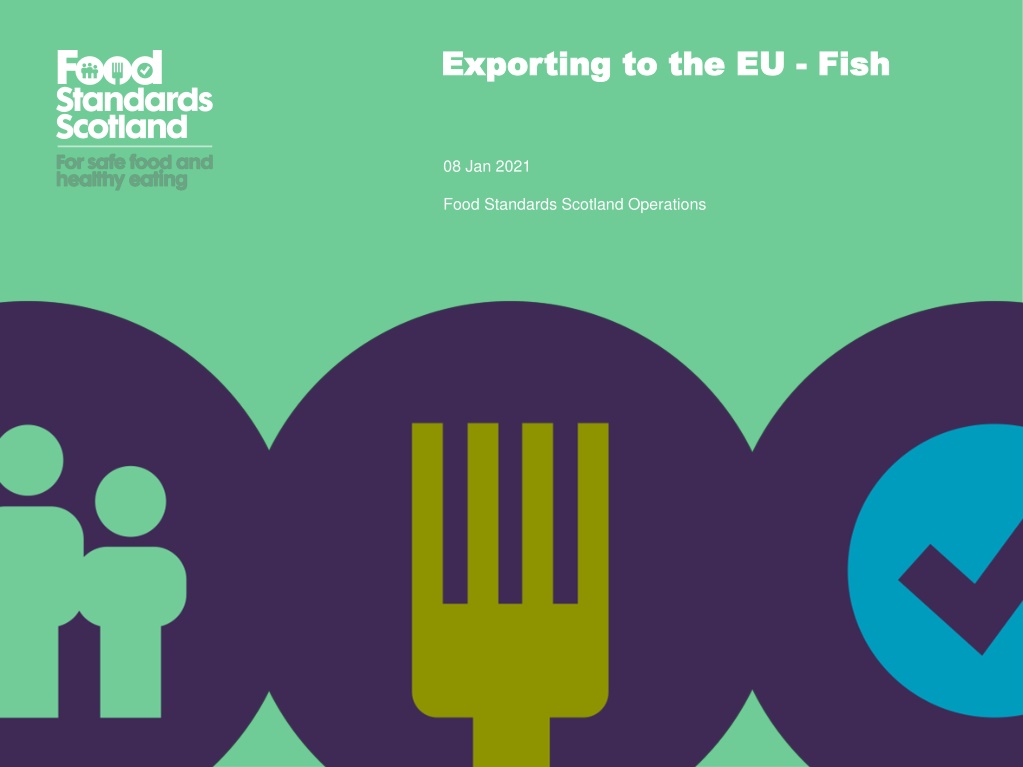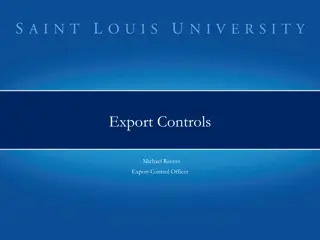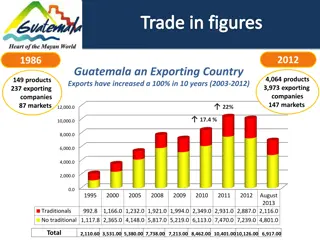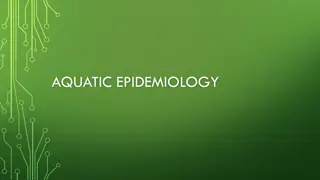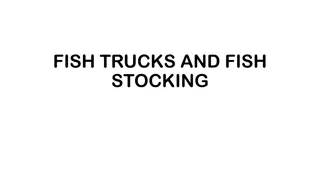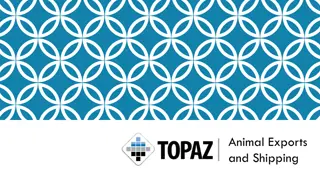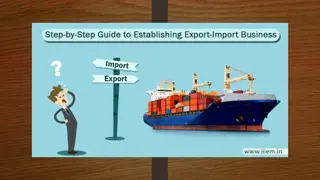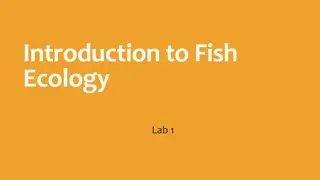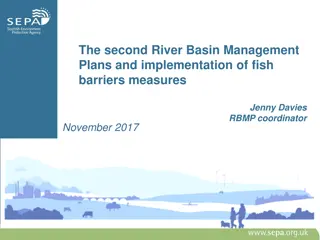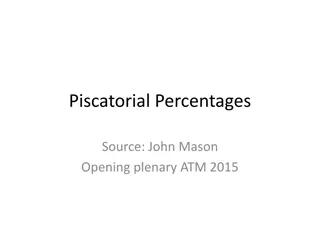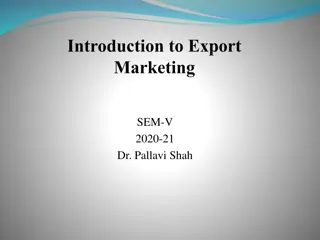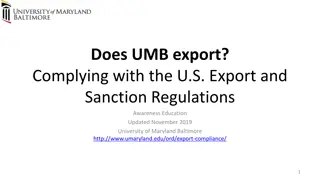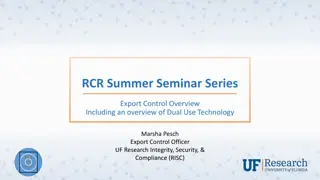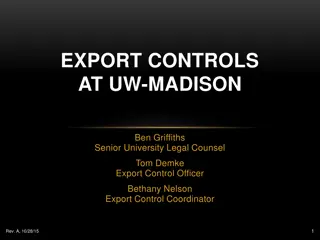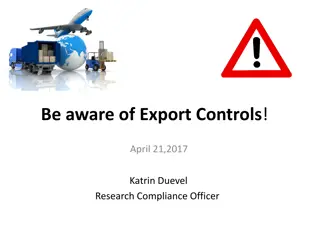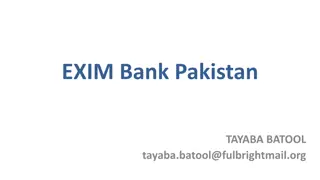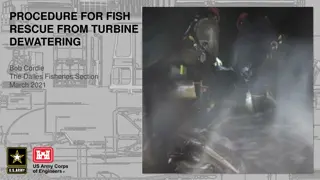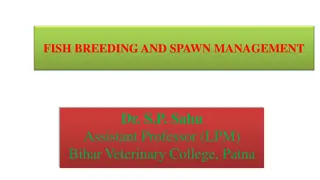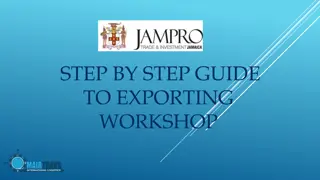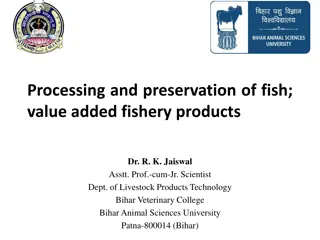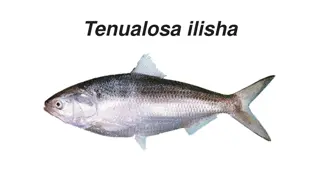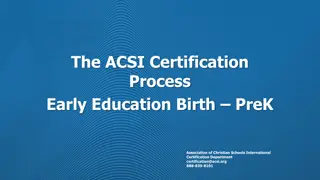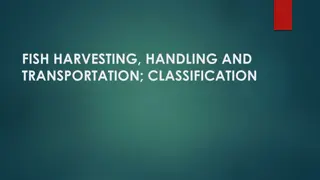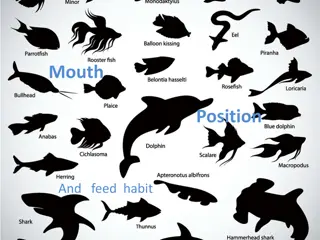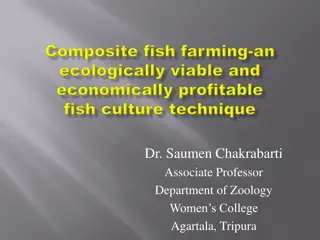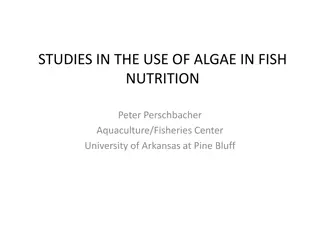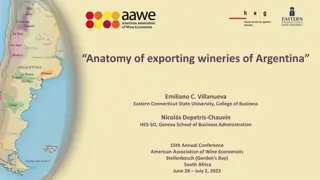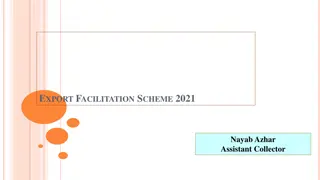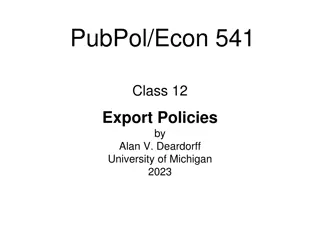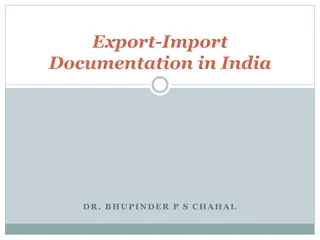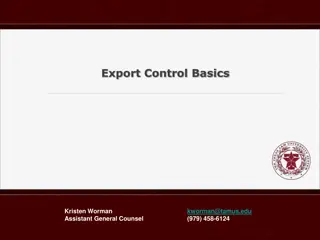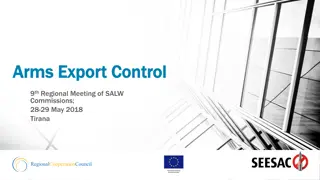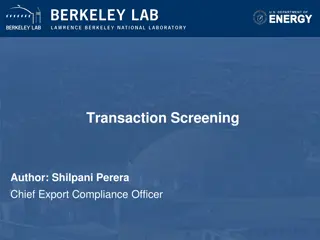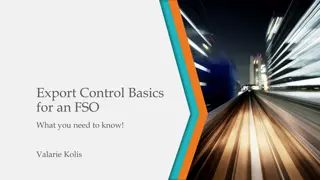Exporting to the EU: Fish Certification Requirements and Export Process
Requirements for exporting fish to the EU include compliance with Approved Premises laws, Retained EU laws, and national surveillance programs. Export Health Certificates (EHCs) are crucial for ensuring compliance, with specific guidelines and processes outlined by authorities. The model for export hubs in Scotland and the delivery procedures for obtaining EHCs are also explained in the context of Scottish operations.
Download Presentation

Please find below an Image/Link to download the presentation.
The content on the website is provided AS IS for your information and personal use only. It may not be sold, licensed, or shared on other websites without obtaining consent from the author. Download presentation by click this link. If you encounter any issues during the download, it is possible that the publisher has removed the file from their server.
E N D
Presentation Transcript
Exporting to the EU Exporting to the EU - - Fish Fish 08 Jan 2021 Food Standards Scotland Operations
Export Official Certification EU export requirements include compliance with Approved Premises applicable law This includes Retained EU law ( EU 852,853, 625 and national surveillance programmes e.g. residues, biotoxins Attestations are needed for Export OVs to sign EHCs are compliant with these. Export OV is designated by APHA APHA act on behalf of Scottish Ministers EHC guidance issued by Defra based on negotiation and interpretation of EU commission requirements 2
Definitions EXPORT HEALTH CERTIFICATE (EHC) Official document issued by APHA and signed and stamped by an APHA trained OV confirming that an export meets the health requirements of the destination country. There are 1900 EHCs (including ABPs) available at https://www.gov.uk/guidance/get-an-export-health-certificate SUPPORT HEALTH ATTESTATION (SHA) Document signed by an OV, Certification Support Officer or a registered Veterinary surgeon to confirm that the POAO accompanying the document has been produced in accordance with the requirements of the importing country. In FSS approved establishments this is an FSS document. 3
Export Hub Model As of 1 January 2021 FSS provide EHC services in 3 logistics hubs in Scotland s central belt: DFDS - based in Larkhall expected to consolidate 350 consignments of seafood per day into 20-40 loads, with each load requiring an EHC. Certifying service requiremed 7 days per week Mesguen based in Harthill expected to consolidate 100 consignments of seafood per day into approx 10 loads or less, with each load requiring an EHC. Certifying service required 6 days per week JDot based in Bellshill expected to consolidate approx 5 loads per day, with each requiring an EHC. Certifying service required 6 days per week Success is predicated on the Hub operators acting as exporter on behalf of their suppliers, providing accurate EHCs and supporting evidence and normally 1 EHC per consolidated load 4
FSS Delivery out with hubs New Export Health Cert SOP FBOs will require to give a minimum of 5 working day notice (in writing) to the FSS Operations Manager All product information and country where the product is to be exported should be stipulated in the request, along with the attendance time requested OM will then respond within 4 hours if FSS are unable to provide the service, the FBO will have to explore another arrangement Alternative Business Agreement A business agreement could be negotiated separately between the FBO and the Operations Manager but only if there is capacity to do so. This would be advantageous to FBOs as it would eliminate the requirement of the 5 day notice period and also provide certainty. If the FBO enters into a separate business agreement for EHCs they will be charged full cost whether they use the time or not 5
Fish Hub process Staff hours are requested by the hub and have continued to be refined during the pilot phase Mesguen and JDOt has 1 Certifying Officer (CO) per day DFDS has 4 staff CO s per day on 2 overlapping shifts from 0900-2100 The hub operator produces an EHC with all details completed for the CO to check A Certifying Support Officer (CSO) provides admin support and conducts reality checks Best estimates are that an EHC will take between 45 minutes to 2 hours to complete depending on complexity and assuming all data is correct Reality checks are discretionary and risk based, driven by historical non compliance, but likely to be 15-30% of a load It may be necessary for some loads to require more than one EHC depending on product type 6
Challenges Theme 1: Communication EHCs being completed by the Certifying Officers (COs), but some hubs later advising they re not required FBO representatives bringing FSS trailer numbers / load numbers, others bringing EHC numbers, however they are not linked in any way, which leads to getting more people involved in trying to reconcile them Hub office staff are not adequately communicating with hub loading / chill staff 2 FBO staff have the ability to request and complete EHCs online, however neither one has access to the entire list for the hub, so they cannot see each other s entries There is no common terminology to identify a specific load leading to delays in reconciliation Agreement required regarding the saving and sharing of final EHC certification 7
Challenges Theme 2: FSS Administration & IT Delays with equipment being sent to the wrong address and further delays due to the festive period CSO still awaiting scanning software to be installed on their laptop Various issues with access to printers, including connectivity Various issues with connectivity to the internet 8
Challenges Theme 3: SOP not being followed Daily schedule of loads not being provided in advance, expectation that our CO s will review the online platform regularly running the risk of EHC being missed Paperwork not being provided, nor lists of batch numbers Lack of communication between staff working in the chill and office staff EHC being returned by the FBO for amendment following changes to product, weights etc resulting in new EHC having to be issued Chiller / loading area staff unable to identify batch numbers, or the difference between batch and harvest codes Last minute changes, even minor ones, lead to the EHC having to be amended, which takes time Schedules (with batch numbers) should be clearly linked to the EHC, by the FBO, before being uploaded, at the moment this is being done by the CO 9
Challenges Theme 4: FSS (and APHA) Technical & Operational matters SOP requires validated and a series of minor amendments / clarifications to the SOP will be recommended separately Various issues with the EHC platform related to numbering and references resulting in the CO having to do manual entries (which takes time) Utilising the ability to provide evidence to the CO by way of photos, CCTV, etc could be used more often Improved communication and co-working is required to avoid duplication of work 10
Key Message 1: Defra are the central competent authority, and issue the key notes for guidance
Key Message 2: The Export Health Certificate journey involves significant preparation and input by the business.
Key Message 3: FSS are assisting fish exporters with the EHC provision, even though this is not their statutory role.
Key Message 4: There is no one-size fits all approach to the EHC signing process.
Key Message 5: The exporter needs to ensure that all the documents and staff are aligned with the process for it to go smoothly
